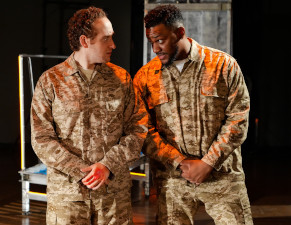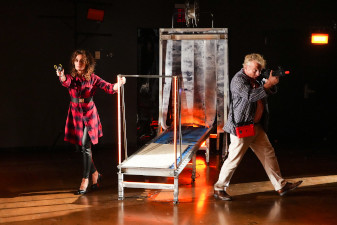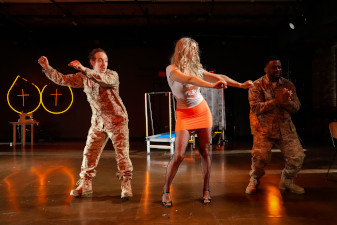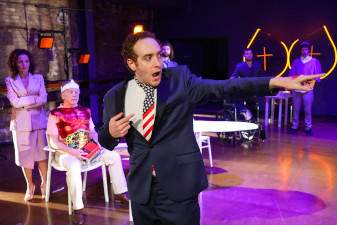
|
Beate Hein Bennett The Finger of Doom Sept. 26 – Oct. 6, 2024
As the world has been roiling in ever expanding wars and people are fighting for their very existence, this rarely performed play by Witold Gombrowicz (1904-1969) about a young soldier returning home from war resonates with immediacy. Gombrowicz, in exile in Argentina, wrote the play in 1946 still in the shadow of WWII. He fingers the touchy subject of how war alters the identity of an individual, of home, of reality, of a nation. Since Homer conceived Odysseus, literature has dealt with the subject of the soldier returning from war and finding the world he had left behind-- his home, his community-- no longer recognizable. More recently, the American public has become painfully aware of how the complex psychological syndrome, called PTSD, afflicts soldiers returning to civilian life after fighting in “theaters of war.” The importance of this New York premiere production, directed by Zishan Ugurlu, is demonstrated by the support given by Polish cultural institutions. An upcoming tour to Poland, with the war in Ukraine raging on, is another significant endorsement.
In a diary entry, Gombrowicz characterised himself as “terribly Polish and terribly rebellious against Poland.” With his novel “Ferdyduke” (1937) he had attained the early reputation as an enfant terrible of letters who would not shy away from satirizing untouchable subjects and the sacred cows of Polish history, namely Catholicism and Nationhood. Satire is a Polish literary tradition that includes such Polish artist/writers, as Stanislaw Wyspianski, Witkacy, and Tadeusz Kantor, all of whom wrote for the theater where their image rich gestural language truly could flourish. The history of Poland is the tragic and absurd development of a nation state as a medieval empire to non-existence after the partitioning and integration into Austria, Prussia, and Russia in the course of the 18th and 19th centuries, and in the 20th century having been occupied and divided up in turn by Nazi Germany and the Soviet Union with borders shifting east, west, south, and north depending on the determinations of the super powers. This complex tragic history is the subtext of much of Polish drama.
Downstairs at LaMama is a large performance space that allows for sweeping movement and diverse quickly shifting configurations among the characters. Zishan Ugurlu with her dramaturgical team, Alexandra Chasin and Shari Perkins, has condensed Gombrowicz’s expansive text (original English translation by Louis Iribarne) into a tightly choreographed performance of ninety minutes. An amazing ensemble of performers execute the ever shifting personae that challenge the sense of sur/ir/reality, experienced by the central character Henry, the soldier returning from war. Henry does not know if he is alive and has come to an unrecognizable home, or if he is dead and is dreaming, nor is he sure of his buddy, Johnny’s bodily existence. However, he knows he has been called to act as though he is in a real set-up—that is the very nature of theater, the “as if” condition that Gombrowicz proposes as the fundamental reality where he questions human values and the political ethos that seems hell-bent on war.
Alex Scoloveno plays Henry brilliantly, not only as his discourse shifts from the self-conscious “excuse me for speaking so artificially”, to being a baffled young man, to turning into a violent self-aggrandizing despot—all the while wondering who, what, and where he really is, except he knows he is in an “artificial” situation: in the theater, or in a dream, or his unrecognizable home? His childhood buddy and fellow soldier Johnny, played with congenial lassitude by Oluwaseun “Kayode” Soyemi, is the one steady anchor in his turmoil who assures him of being of right mind. Henry’s Mother and Father are played by Anna Podolak and Bill Bowers with full-tilt mad theatricality—they become at one point the anointed Queen and King, only to be ultimately usurped and banished by Henry. A trio of vulgar Drunkards shape shift into Dignitaries, representative of a royal court, e.g. Chancelor/Traitor (Gardiner Comfort), Chief-of-staff (Conor Andrew Hall), and a Bishop/Cardinal (Jackson Scott), the requisite representative of the church. These three first careen around as violent goons, and then, as sycophants, encircle the would-be royalty. One wheelchair bound Drunkard (Celeste Ciulla) shape shifts from foul-mouthed vicious male pig to elegant smooth talking female Ambassador. And there is Henry’s former fiancée Mary turned Serving Girl Molly in the parents former manorial home turned ruinous tavern. Annie Hägg whose fantastic jazz club singing Molly -- she “serves” everybody-- first greets the audience as a “curtain warmer” plays Mary/Molly with a mix of impish innocence and subtle irony. Selective design elements keep the playing space free for the actors to move about with ease. The modernistic set and gorgeous lighting design by Michal Dracz support Ms. Ugurlu’s vision brilliantly with elements that work as visual metaphors and some being centrally emblematic to Polish culture. Krystian Szymczak’s handsome modern costumes and theatrical props add also humorous touches to the characters. Sam Sellers sound design ranges from DJ type of support for Molly’s bar room singing to the realistic booms of artillery fire. I hope that this fine production which has had near sold-out performances will have another run in New York upon returning from Poland. |
| recordings | coupons | publications | classified |




